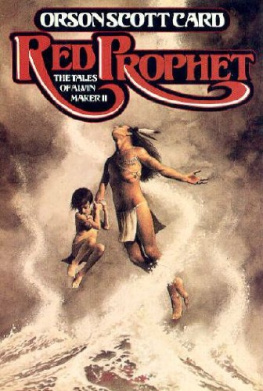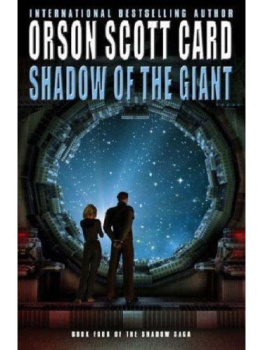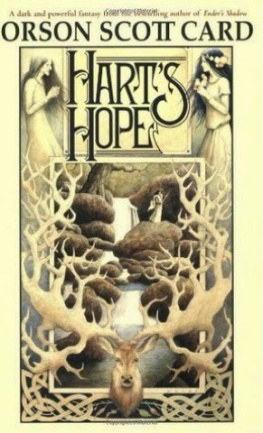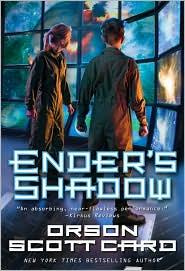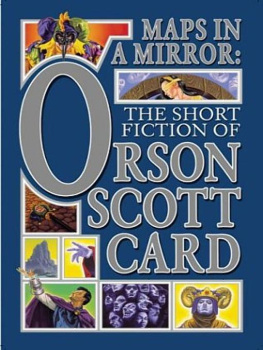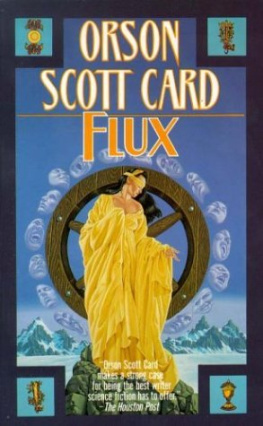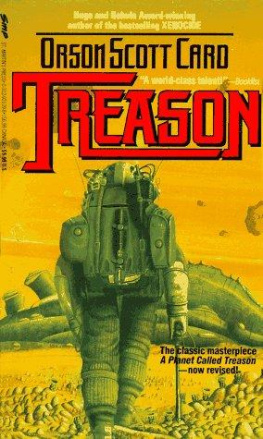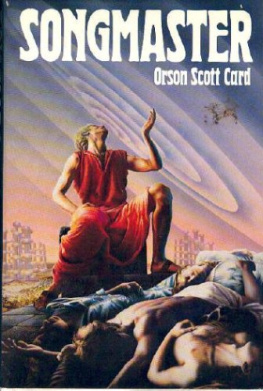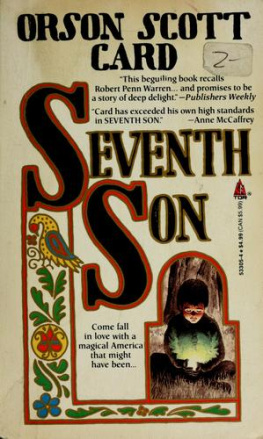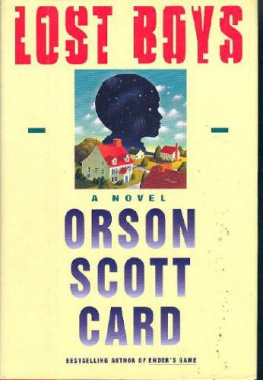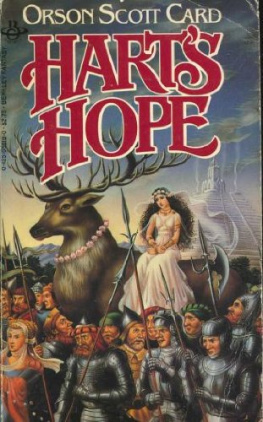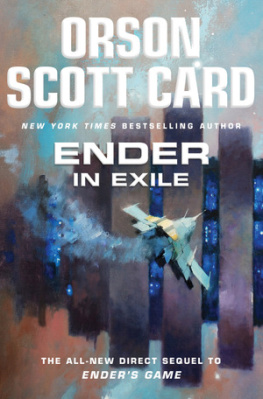Orson Scott Card - Magic Street
Here you can read online Orson Scott Card - Magic Street full text of the book (entire story) in english for free. Download pdf and epub, get meaning, cover and reviews about this ebook. year: 2005, publisher: Del Rey/Ballantine Books, genre: Detective and thriller. Description of the work, (preface) as well as reviews are available. Best literature library LitArk.com created for fans of good reading and offers a wide selection of genres:
Romance novel
Science fiction
Adventure
Detective
Science
History
Home and family
Prose
Art
Politics
Computer
Non-fiction
Religion
Business
Children
Humor
Choose a favorite category and find really read worthwhile books. Enjoy immersion in the world of imagination, feel the emotions of the characters or learn something new for yourself, make an fascinating discovery.

- Book:Magic Street
- Author:
- Publisher:Del Rey/Ballantine Books
- Genre:
- Year:2005
- Rating:5 / 5
- Favourites:Add to favourites
- Your mark:
- 100
- 1
- 2
- 3
- 4
- 5
Magic Street: summary, description and annotation
We offer to read an annotation, description, summary or preface (depends on what the author of the book "Magic Street" wrote himself). If you haven't found the necessary information about the book — write in the comments, we will try to find it.
Magic Street — read online for free the complete book (whole text) full work
Below is the text of the book, divided by pages. System saving the place of the last page read, allows you to conveniently read the book "Magic Street" online for free, without having to search again every time where you left off. Put a bookmark, and you can go to the page where you finished reading at any time.
Font size:
Interval:
Bookmark:

ACKNOWLEDGMENTS
This novel began in 1999 with a letter from Roland Bernard Brown, a friend of mine who grew up in an upper-middle-class black family in Southern California. We had been talking about racial issues in America (and have continued the conversation for many years since then), but one of his biggest regrets was that black men get short shrift in literature. He wondered why I had never written a black hero in my fiction.
I reminded him of Arthur Stuart, a major character in the Alvin Maker booksbut he reminded me that Arthur was a sidekick, not the hero.
The problem with my writing a black herousing his point of view, seeing the world through his eyesis that Im not a black man myself and probably never will be. I didnt grow up in black culture and so I would make a thousand mistakes without even knowing it.
Whereupon Roland promised me that he would help. He would give me background. He would catch my mistakes and help me get back on track.
Then you should write the book yourself, too, I said.
Someday he would, he told me. But that didnt let me off the hook.
Because I was intrigued by the idea. Roland had told me stories from his life, growing up in a mixed middle-class neighborhood in Los Angelesthe subtle (and not so subtle) ways that he was told that his acceptance was less than total.
But I didnt want to write a novel about racethat is, I didnt want to write about racial conflict. So we decided together that the ideal place to set this book was in Baldwin Hills, a middle- to upper-middle-class black neighborhood in Los Angeles between La Cienega and La Brea. There, I could create a community of African-Americans who had made itor whose parents had made itout of the morass of poverty and oppression.
When next I was in Los Angeles, my cousin Mark and I drove to Baldwin Hills and took pictures. I was impressed by the great variety of the houses, from impressive demi-mansions on the slopes of the hills to the more modest, but still well-tended and attractive homes in the flat. It was a neighborhood with tire swings here and there, occasional yards with eccentric plantings or houses with odd paint jobs; the flat of Baldwin Hills, in fact, reminded me of the neighborhood I had grown up in farther north, in Santa Clara.
It felt like what I had imagined when reading Ray Bradburys Dandelion Wine.
Above the neighborhood was the Kenneth Hahn State Recreation Area, which had a drainage system that funneled rainwater down into the steep valleys where the wealthiest houses of Baldwin Hills stood. The park had gorgeous views of Los Angeles to the northand of old oil wells to the south.
And between the park and the neighborhood, there was a wild area that ended in a basin surrounding a drainpipe. In a torrential rain, the runoff from the wild hills would collect there and then be drained away so it wouldnt flood Baldwin Hills.
I knew then that my story would be about the leakage of magic into the world, right there where it would spill out over this particular neighborhood; and because no one would be likely to believe what the residents were going through, they would have to solve the problem themselves. I called it Slow Leak.
Its a long way from a situation to a story. It took me so many years to come up with a good character that sometimes I despaired. I made two attempts at beginning the tale. One was the short story Waterbaby,* my first telling of the tale of Tamika Brown.
Later I came up with the character of Yolanda Whitethe motorcycle-riding hoochie mama who scandalized the neighborhood. And that finally led me to the character of my hero, Mack Street, the baby who was found by the drainpipe at the hairpin turn of Cloverdale. My first stab at writing it appeared as the short story Keeper of Lost Dreams.**
Finally I found the character of Byron Williams and the way that Mack Street was born into the world, and finally this novelwhich I now was calling by its present titlebegan to take shape. It was still painful going, and so many years had passed since my first expedition to Baldwin Hills with my cousin Mark that I had to go back and refresh my memory of the place. Aaron Johnston, one of my partners in my film company and a wonderful writer himself, came armed with a digital camera, and those were the pictures I consulted during the writing of the book.
I knew the physical place, but not the people. I dont know a single soul who ever lived in Baldwin Hills. So for those readers who do, I can tell you right now that nobody in this book is based on anybody who lives there. If you think you recognize a real person in this book, it only shows that guys who make stuff up for a living sometimes hit close to reality entirely by accident.
Then, with the book about half written, I went back to Baldwin Hills and was horrified to discover that in the process of construction of a new house just below the hairpin turn, someone had stripped all the grass and greenery from the basin surrounding the drainpipe. Instead of looking like an idyllic meadow straight out of Shepherds Calendar, it looked like Mordor.
Disaster! Even though it wouldnt matter to most of the readers of the book, I wanted people to be able to drive up Cloverdale and see the scene that I described!
But the solution was obvious: I would have an event in the book that explained why the basin looked burned over.
The final key to the novel did not come, however, until I was floundering about in mid-book, and it dawned on me who Yo Yo and Bag Man really were. I had once designed and built the set for a production of A Midsummer Nights Dream, and I realized that if Yo Yo were Titania and Bag Man were Puck, the story would take on a whole new layer of meaning.
I went back and revised and rewrote, and now the middle of the book came together. All that remained was the realization that Word Williams, instead of forgetting the birth of Mack Street, should remember it and be Oberons tool in the mortal world. Finally, all the elements were in place and I could finish the book.
What Roland Bernard Brown asked me for, I finally was able to deliverthanks to his help, before, during, and after the writing of the book. In fact, it turned out to be overkill, since the characters of Ceese and Word took on so much life for me that one could argue that Magic Street is a novel with three black male heroes.
It is too much to hope that my depiction of a culture that I have never belonged to will be error-free. I assure you that all the errors are mine, the inevitable result of being a stranger; but it is thanks to Roland and other African-American friends that the errors are not more numerous and more egregious.
Besides driving and hiking around Baldwin Hills and Hahn Park with me, Aaron and Mark helped in other ways. Its because of the boundless hospitality of Mark and Margaret Park that I have had the chance to know and love Los Angeles as I do; that magical place where Avenue of the Stars flies over Olympic is on my regular running path when I stay with them, sometimes for weeks on end, working on projects in the city. And significant portions of this book were written on the table in the spare room they let me inhabit.
Aaron Johnston obtained for me the official maps of Baldwin Hills that I used as a resource. And he worked like a crazy man to produce Posing as People (besides writing one of the one-act plays within it), so that I could direct the plays and still have time to write on Magic Street during those hot August days in the summer of 2004.
I was helped by my normal crew of pre-readersKathy H. Kidd, Erin Absher, and, as always, my wife, Kristine, who also had to suffer through every idea I came up with for the story over a period of five years. Kristine also performed financial miracles, keeping everything afloat while I was six months later than I thought Id be in completing this novel.
Next pageFont size:
Interval:
Bookmark:
Similar books «Magic Street»
Look at similar books to Magic Street. We have selected literature similar in name and meaning in the hope of providing readers with more options to find new, interesting, not yet read works.
Discussion, reviews of the book Magic Street and just readers' own opinions. Leave your comments, write what you think about the work, its meaning or the main characters. Specify what exactly you liked and what you didn't like, and why you think so.

